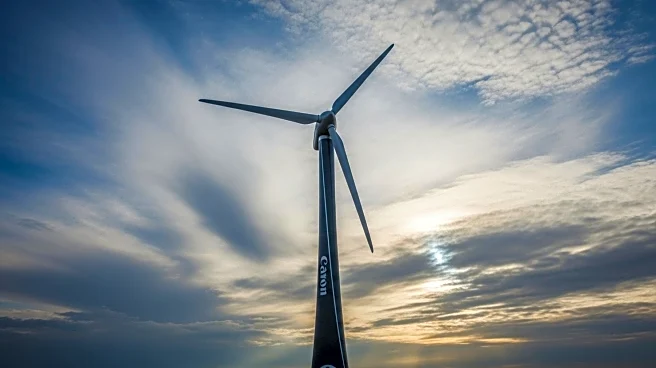What's Happening?
A federal judge has ruled in favor of Denmark's Orsted, allowing the continuation of the Revolution Wind offshore project, which had been halted by a stop-work order from the U.S. Bureau of Energy Management on August 22. The project, located 15 miles off the coast of Rhode Island, was 80% complete with 45 of 65 wind turbines installed when the order was issued. Connecticut's Democratic Governor Ned Lamont expressed support for the project, highlighting its potential to power 350,000 homes, reduce energy costs, and create jobs. Orsted and its partner, Skyborn Renewables, have invested approximately $5 billion in the project, with potential breakaway costs exceeding $1 billion if canceled.
Why It's Important?
The ruling represents a significant development in the U.S. clean energy sector, as it allows a major offshore wind project to proceed despite opposition from the Trump administration. This decision underscores the ongoing legal and political battles over energy policy in the U.S., particularly between renewable energy initiatives and traditional energy interests. The project's continuation could bolster the clean energy industry, providing economic benefits through job creation and energy cost reduction. However, it also highlights the challenges faced by renewable energy projects in navigating regulatory and political hurdles.
What's Next?
The Trump administration has indicated that the ruling may not be the final decision, suggesting potential further legal challenges. Stakeholders in the clean energy sector will likely monitor the situation closely, as the outcome could influence future offshore wind projects and broader energy policy. Political leaders and environmental groups may continue to advocate for renewable energy initiatives, while traditional energy interests may seek to reinforce their positions through legal and political channels.
Beyond the Headlines
The case highlights the broader ethical and environmental considerations in energy policy, as the transition to renewable energy sources is often framed as a necessary step to combat climate change. The legal battles over such projects reflect deeper societal debates about the balance between economic growth, environmental protection, and energy independence. Long-term shifts in energy policy could be influenced by the outcomes of such legal challenges, potentially shaping the future landscape of U.S. energy production.








